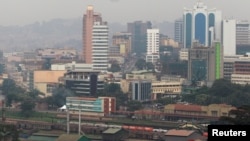A Ugandan court has charged human rights lawyer Nicholas Opio with money laundering following his arrest Tuesday. Opio's lawyers say the charges are political because of his support for opposition leader and presidential candidate Robert Kyagulanyi, known as Bobi Wine.
The state alleges that on October 8, at a branch of Absa Bank in Kampala, Nicholas Opio acquired $340,000 in the name of the human rights organization Chapter Four. Prosecutors say at the time, he knew the funds were proceeds of crime.
“That court does not have jurisdiction to handle that matter. So, the magistrate just read the charges to him and remanded him to Kitalya prison up to Monday next week," says Solomon Muyita, the judiciary spokesperson. "His file is supposed to be transferred to the anti-corruption court. It’s where the matter is going to be handled going forward.”
Two of Opio’s colleagues, who were arrested with him, have been released on bail.
Opio’s lawyer, Eron Kiiza, says the government just needed a holding charge to imprison Opio, but that this has nothing to do with his work.
“They are harassing him for his perceived support for Bobi Wine. It’s not money laundering; they know his books. They searched his house and they found nothing,” he said.
Activists say the state is criminalizing civil society work and persecuting civil society organizations and individual leaders.
Uganda police spokesperson Fred Enanga says these allegations are unfounded and they should allow investigations to prove his innocence or guilt.
“There is no activist who is above law. If they are involved in suspicious activity, we have to investigate them to help disprove or prove some of these claims,” he said.
Opio, who is executive director of Chapter Four Uganda, was arrested by plain clothed police officers at a restaurant Tuesday evening.
According to Chapter Four, at the time of his arrest, Opio was working on collecting evidence surrounding the killings and arrests that occurred after protests November 18 and 19.
The protests, sparked by the arrest of Wine, resulted in clashes between security forces and opposition supporters. Fifty-six people were killed.




